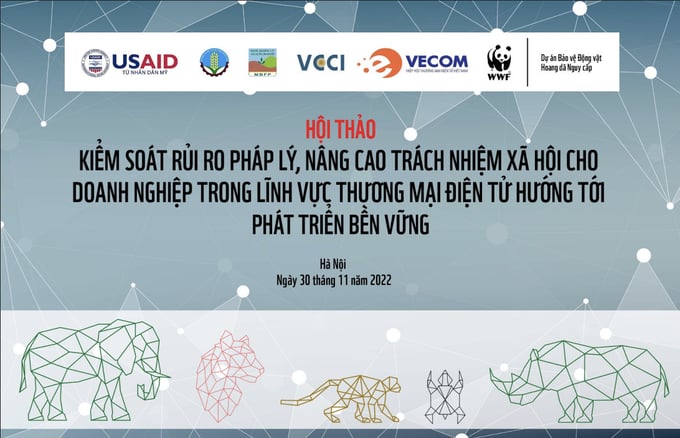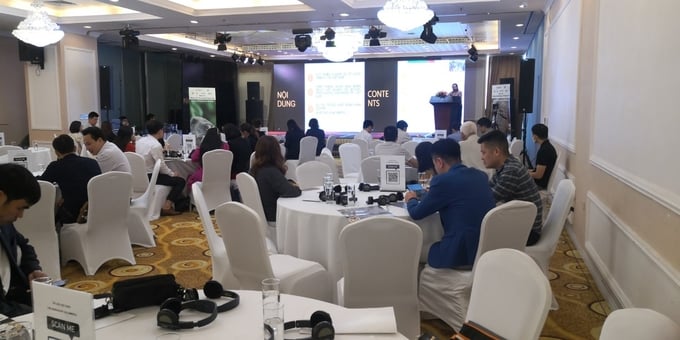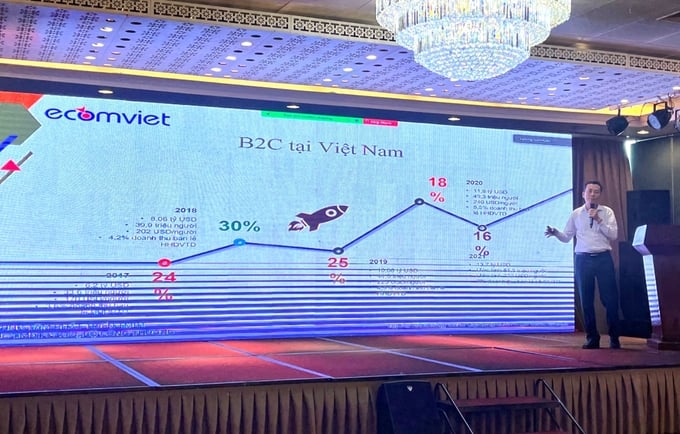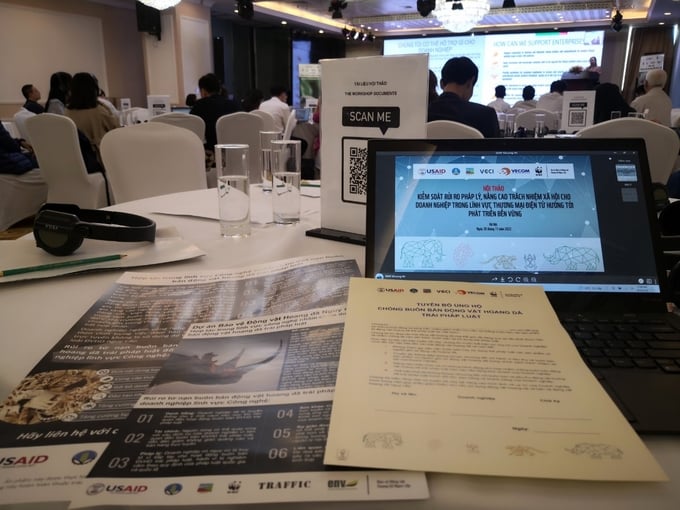May 17, 2025 | 12:41 GMT +7
May 17, 2025 | 12:41 GMT +7
Hotline: 0913.378.918
May 17, 2025 | 12:41 GMT +7
Hotline: 0913.378.918

The Endangered Wildlife Project, funded by the United States Agency for International Development (USAID), held a Workshop on “Enhancing social responsibility towards sustainable development and reduce risks from illegal wildlife trade in cyberspace” on November 30, 2022 in Hanoi.
The project is jointly implemented by the Management Board of Forestry Projects (MBFP) under the Ministry of Agriculture and Rural Development (MARD) and the World Wide Fund for Nature (WWF). The Vietnam Chamber of Commerce and Industry - Small and Medium Enterprises Support Center (VCCI-SMEPC) and the Vietnam E-commerce Association (VECOM) are the co-organizers of the workshop.

Overview of the workshop. Photo: Hai Nam.
The workshop highlighted the risks and challenges for technology companies as well as introduced the activities organized by the Coalition to End the Online Wildlife Trade. This is a movement against illegal wildlife trade in the cyberspace consisting of 47 global and regional technology companies including Meta, Microsoft, Google and Lazada. The Coalition has developed the Online Wildlife Education & Training (OWLET) software; the project has supported the Vietnamese localization of the software and introduced it at the Workshop.
Ms. Michelle Owen, Director of the Contractor's Office of Endangered Wildlife Project under WWF introduced briefly about the project: "With the support from USAID, the Endangered Wildlife Project raises awareness and helps businesses to understand the supply chain and how illegal wildlife crime lines operate. With international and regional connections, Vietnamese technology companies can play an important role in combating the illegal wildlife trade by restricting ads and banning illegal trading on its internet platforms”.
Discussion in the workshop also revolved around risks in online busines activities on e-commerce platforms as well as their respective solutions; Providing support to technology companies to respond to legal risks including those from illegal wildlife trade, by improving corporate social responsibility and compliance with the law.

Mr. Nguyen Van Thanh, Director of E-Commerce Development Center, Department of E-commerce and Digital Economy under the Ministry of Industry and Trade presenting about the overview of business activities on online shopping channels and e-commerce platforms in Vietnam. Photo: Hai Nam.
Commenting on the workshop, Ms. Annie Wallace, Head of Climate Change, Energy and Environment Division under USAID Vietnam said: “USAID values Vietnam's efforts in combating illegal wildlife trade. This is also a priority for the US Government on an international and regional scale. Private businesses play an extremely important role in combating the illegal trade of wildlife by enhancing corporate social responsibility, and recommending improvements to the policy framework.
Mr. Bui Trung Nghia, Vice President of the Vietnam Chamber of Commerce and Industry commented: “VCCI highly regards cooperation opportunities to raise awareness for Vietnamese businesses in the current economic integration context, and most notably the training program on online illegal wildlife training. Business development, specifically e-commerce activities, must strictly comply with the law and business ethics, including the implementation of social responsibility and environmental protection. Vietnamese businesses' investment in responsible business activities towards sustainable development is steadily rising, with the goal of improving competitiveness and international integration.
Participants of the workshop discussed e-commerce measures such as zero-tolerance policies against illegal wildlife trade, the integration of measures against illegal wildlife trade into the sustainable strategy and corporate social responsibility, and participation in the Coalition to End the Online Wildlife Trade.

Businesses discuss and sign statements supporting the fight against illegal wildlife trade. Photo: Hai Nam.
At the end of the workshop, the heads of Minh Quan Phu Quoc Co., Ltd., 3G Telecommunication Joint Stock Company, BENEW Co., Ltd., Au Lac Group and HAVANA Import-Export Co., Ltd. signed a commitment to strengthen actions against illegal wildlife trade in cyberspace, as well as expressed their desire to consult and support resources against illegal wildlife trade.
The hunting and trading of wildlife have been recognized as a threat to biodiversity, the ecosystem as well as the human health. The Covid-19 virus has been theorized to originate from wild animals.
The Asia region, and most notably Vietnam, has been identified as a global "point of interest" with an extremely high risk of new infectious pathogens, including zoonotic, wildlife or ecological diseases. Most importantly, the hunting, trade and consumption of wild animals is considered an existential risk leading to disease transmission due to unquarantine contact between animals and humans.
Translated by Nguyen Hai Long

(VAN) The 'For a Green National Environment' programme aims to promote a green lifestyle, support businesses in implementing ESG practices, and turn Net Zero commitments into concrete actions.

(VAN) Cold-barn systems efficiently manage environmental and temperature conditions, which aids in the prevention of respiratory diseases in pigs and protects them from the vectors that transmit African swine fevers.

(VAN) To tackle challenges, the project 'Addressing key technical bottlenecks in the grouper supply chain in Vietnam' has been underway since 2024.

(VAN) The project 'Disease-Resilient and Sustainable Cassava Production Systems in the Mekong Region', funded by the Australian Center for International Agricultural Research (ACIAR), is being implemented from 2024 to 2028.

(VAN) Data from 10,000 farming households will help professionalize production organization and support the implementation of the One Million Hectares Program for High-Quality, Low-Emission Rice Cultivation.

(VAN) FAO Director-General QU Dongyu marks International Day of Plant Health at NENA conference.

(VAN) Deputy Minister of Agriculture and Environment Hoang Trung affirmed that floriculture and ornamental plants are a growing industry that receives significant global attention.